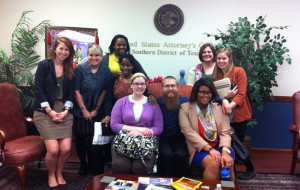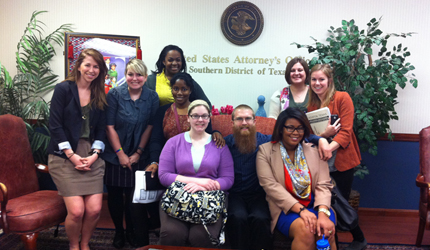
Students gather for a group photo at the U.S. Attorney’s Office in Houston after meeting with prosecutors Ed Gallagher and Ruben Perez, assistants to the U.S. attorney in Houston.
By Caitlin Giddens
Reporter
Within 48 hours of running away from home, one in three young girls are at risk for human trafficking.
Slavery seems to be a forgotten struggle. But as members of Baylor’s International Justice Mission and other students discovered during their spring break mission trip in Houston, sex trafficking brings human slavery to a reality.
According to a 2009 International Labor Organization study, 12.3 million people are enslaved worldwide through human trafficking, and it’s a reality students are determined to change by educating Baylor and the community of its existence.
“Organizations in Houston are trying to build trust and empowerment for trafficking victims,” said Katy sophomore Kristina Miller, an International Justice Mission member who attended the trip. “They’re trying to restore victims so they won’t fall into the trafficking world they know.”
Houston has the second highest trafficking population in the country, closely trailing Los Angeles. But local city organizations are striving to end the epidemic.
“The reason Houston is so impressive in its anti-human trafficking strategy is that sectors that usually don’t communicate are working together,” said Paige Panter, VISTA for service-learning in the student activities department. “Federal prosecutors are collaborating with social workers to tackle modern day slavery from the criminal and victim end. The issue is so systemic, so wide-reaching that meaningful change will require several entities to do their part.”
During spring break, Baylor students met with the Houston Restore and Rescue Coalition to discuss its role in fighting trafficking.
“HRRC stressed the difference between smuggling foreigners and trafficking girls,” Miller said. “They’re not the same. But smuggling can become human trafficking.”
The students also met with prosecutors at the U.S. Attorney’s Office to learn how they prosecute traffickers.
Miller said there is a lack of sympathy for trafficking victims, as smuggling and prostitution evoke judgment in much of society.
“Just because they’re foreigners or considered prostitutes doesn’t mean they don’t deserve sympathy,” Miller said.
“It probably wasn’t their choice to be sexually exploited. That’s why we’re striving to change how society sees these women because they’re victims.”
While in Houston, Baylor students also met with the local YMCA to learn about the services provided to trafficked persons.
“They actually work with victims and try to restore them,” Miller said. “Providing an education is really important because many trafficked persons are foreigners. The YMCA in Houston also tries to improve the perspective victims have of relationships with men.”
Because nearly every man these victims have encountered has sexually exploited them, the victims’ perspective of the opposite gender is distorted. Even if victims survive human trafficking, they may be permanently weary of men. But the YMCA is Houston is striving to redefine the role men play in these women’s lives.
“How can you ever enter the work world when you have a hatred and fear of men?” Miller asked.
“That’s why the YMCA tries to build victims’ trust.”
Baylor students also learned the suspicious signs of businesses that serve as a trafficking front, such as a 24-hour massage parlor.
“Obviously there can’t be numerous 24-hour massage parlors and karaoke bars on the low-income streets of Houston,” Miller said. “That’s when education of human trafficking is most important. The police may not be able to bust them for trafficking since it’s difficult to prosecute, but they can investigate the business for money laundering or other offenses.”
As students learned at prosecutor Ed Gallagher’s office, the legal perspective of fighting human trafficking is also essential.
“This cause isn’t just for social workers,” Miller said. “[Gallagher is] committed to prosecuting these crimes and helping victims.”
Gallagher opened the conversation by briefing students on recent trafficking cases and discussing the statistics of sexual exploitation.
The trafficking epidemic doesn’t just involve statistics, but real stories of real people.
“Because there is not a single, universally-held definition of trafficking, and trafficking comes in several forms, we encountered instances of unreliable data,” Panter said.
“Whether they are on the low or high end, the numbers are staggering. Still, we’ve found it to be more useful to focus on the stories of victims rather than the number. Statistics don’t probe conversation and constructive dialogue in the way that stories do.”
And Baylor students discovered in Houston that starting the conversation about human trafficking is the first step. The trafficking battle that lies ahead may be daunting, but Sugar Land junior Alex Scheibner gained positivity from the Houston mission trip.
“While the human trafficking situation in Houston is enormous, organizations are working very well together,” Scheibner said. “There’s also enormous progress in preventing trafficking throughout the last decade. The statistics may cause hopelessness, but these organizations in Houston are bringing hopefulness.”





